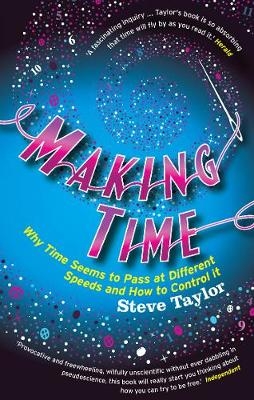
Making Time
Why Time Seems to Pass at Different Speeds and How to Control it
Seiten
2008
Icon Books (Verlag)
978-1-84831-001-8 (ISBN)
Icon Books (Verlag)
978-1-84831-001-8 (ISBN)
- Titel z.Zt. nicht lieferbar
- Versandkostenfrei innerhalb Deutschlands
- Auch auf Rechnung
- Verfügbarkeit in der Filiale vor Ort prüfen
- Artikel merken
An exploration of the different perceptions of time, the five basic 'laws' of psychological time, and the factors which cause them.
Why does time seem to speed up as we get older? Why does it seem to drag when we're bored or in pain, or to go slowly when we're in unfamiliar environments? Why does it slow down dramatically in accidents and emergency situations, when sportspeople are 'in the zone', or in higher states of consciousness?
Making Time explains why we have these different perceptions of time, suggesting that there are five basic 'laws' of psychological time and uncovering the factors which cause them. It uses evidence from modern physics and unusual states of consciousness to suggest that our normal sense of time is an illusion, 'created' by our minds. But perhaps more importantly, on a practical level, this book shows us what we can do to control our sense of time passing, to make it pass slowly or quickly in different situations. It suggests that it is possible for us to live through more time in our lives, and so effectively increase the amount of time which we are alive for.
In the final chapter, Steve Taylor uses insights from Buddhism - investigating the practices of mindfulness and meditation - to show how we can actually transcend linear time, and learn to live fully in the present moment.
Why does time seem to speed up as we get older? Why does it seem to drag when we're bored or in pain, or to go slowly when we're in unfamiliar environments? Why does it slow down dramatically in accidents and emergency situations, when sportspeople are 'in the zone', or in higher states of consciousness?
Making Time explains why we have these different perceptions of time, suggesting that there are five basic 'laws' of psychological time and uncovering the factors which cause them. It uses evidence from modern physics and unusual states of consciousness to suggest that our normal sense of time is an illusion, 'created' by our minds. But perhaps more importantly, on a practical level, this book shows us what we can do to control our sense of time passing, to make it pass slowly or quickly in different situations. It suggests that it is possible for us to live through more time in our lives, and so effectively increase the amount of time which we are alive for.
In the final chapter, Steve Taylor uses insights from Buddhism - investigating the practices of mindfulness and meditation - to show how we can actually transcend linear time, and learn to live fully in the present moment.
Steve Taylor PhD is the author of several best-selling books on psychology and spirituality, and is a senior lecturer in psychology at Leeds Beckett University. He is the current chair of the Transpersonal Psychology Section of the British Psychological Society. His other books include Waking From Sleep, The Fall, Out of the Darkness, Back to Sanity, The Leap and Spiritual Science. He lives in Manchester with his wife and children.
| Erscheint lt. Verlag | 3.7.2008 |
|---|---|
| Verlagsort | Duxford |
| Sprache | englisch |
| Maße | 129 x 198 mm |
| Gewicht | 249 g |
| Themenwelt | Sachbuch/Ratgeber ► Gesundheit / Leben / Psychologie ► Psychologie |
| Sachbuch/Ratgeber ► Natur / Technik | |
| Geschichte ► Hilfswissenschaften ► Chronologie | |
| Naturwissenschaften ► Physik / Astronomie ► Astronomie / Astrophysik | |
| ISBN-10 | 1-84831-001-3 / 1848310013 |
| ISBN-13 | 978-1-84831-001-8 / 9781848310018 |
| Zustand | Neuware |
| Haben Sie eine Frage zum Produkt? |
Mehr entdecken
aus dem Bereich
aus dem Bereich
Buch | Hardcover (2024)
John Wiley & Sons Inc (Verlag)
139,95 €


